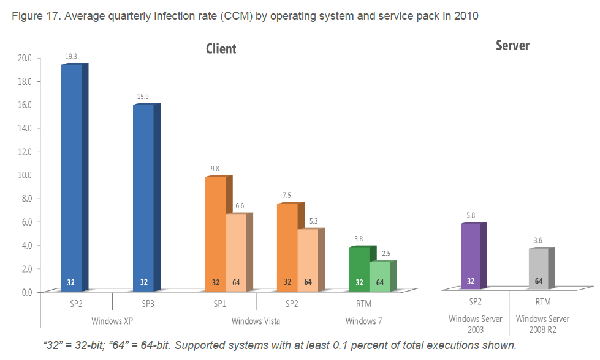Microsoft just released its security report and according to the data, Windows 7 is over 5 times more secure than Microsoft’s old operating system, Windows XP. Many people complained heavily about security when using XP and it seems they were right in doing so, although in Microsoft’s defense, XP is almost a decade old at this point and there is only so much you can patch and alter without totally rebuilding the system. This need for a major refresh is seen with even Windows Vista being twice as secure as XP, while Vista had many flaws, its one feature that it always beat XP in was security and Microsoft upped the stakes with Windows 7, making it both less intrusive than Vista and more secure according to the data.
This report is most intriguing for businesses, who have been reluctant to upgrade from XP, with the majority of them skipping Vista completely in their upgrade cycle and many of them holding out from Windows 7 until Microsoft released service pack 1. With XP usage accounting for 2/3 of all PCs before Windows 7 release and now it’s down to a 40% with Windows 7 up to 36% and Vista down to under 8%. This is a clear sign that people are ready to move over from XP, with Windows 7 losing the majority of the bloat from Vista and having very high security standards compared to its former versions.
The biggest thing to note is the benefits to businesses from Windows 7’s enhanced security. Currently virus’s cost people about 50 Billion dollars annually, considering the cost of downtime on top of costs of actually eradicating the virus from the system. This means that a business who upgrades from Windows XP to 7 can hope to see a fifth of the viruses on their network compared to using all XP machines over time. Many business’s argued with Microsoft when Vista first debuted, saying that there was no real benefit from upgrading from XP to Vista and that it cost more to buy hardware capable of running Vista. With Windows 7 needing less requirements and having 5 times better security than XP it is a great time and a money saver for businesses to make the move to Windows 7. With desktop prices so low, the increase of productivity and the increased security make it an ideal time for an upgrade. Even with Windows 8 only a year or two away, as many companies refuse to use a Windows OS without a service pack update, it will be at least a year after its release before it will be suitable for a business environment.












